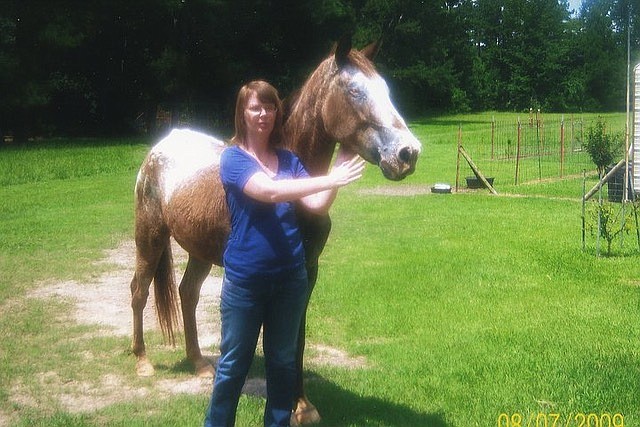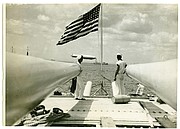The horse who helped raise me was a sweet but stubborn soul.
She was an Appaloosa filly that Daddy named Shy Ann. Ironically, she was never very shy and loved to be in the middle of things.
Granddad, who brought her home in his ancient stock trailer, called her Speckle Butt for the white blanket of spots across her rump.
I was proud to call her mine. But really, I belonged to her.
I was her girl and she knew it. And for a big part of my life, she was often just a step behind me in the pasture or right by my side.
Shy Ann could be very stubborn and hard-headed. She wasn't perfect and neither was I, but maybe we were just what the other needed at the time.
Granddad bought her when I was 15. He saw an ad at the feed store about a filly for sale.
The man who owned her had to sell his horses for some reason. She was just 5 months old.
Shy Ann could hear the back door of my parent's house open from a mile away. It was the same with the back gate. She associated these noises with dinnertime and time with her people.
Two of her favorite things.
Her feeding schedule gave structure to my days. Grooming her became one of my life's simplest pleasures.
Yes, I was raising her. But years later, I realized she had helped raise me.
Shy Ann taught me a lot about commitment and a lot about compassion. During my teen years, when I was insecure about a lot of things, she gave me self-confidence. I was not sure of my place in the world or what I was capable of, but I knew this strong but also fragile creature depended on me. This beautiful animal responded to my voice and ate from my hand.
And then, when she was still quite young, Shy Ann began to lose her eyesight. She was bumping into things in the pasture and her eyes became cloudy and were sometimes red and irritated. We took her to two veterinarians and also began asking around, trying to find out what had happened to her eyesight and if it could be fixed.
We didn't get a lot of answers. But we got a lot of opinions.
And that's when it hit home to me how quickly an animal can be considered disposable.
So many people told my parents to sell her: You can't ride her. You don't want to breed her. What good is she?
Thankfully, my parents were not the kind of people to throw an animal away. Shy Ann was family and Shy Ann was home.
Before Shy Ann, I was naive about some things. I assumed everyone who had an animal, especially anyone fortunate enough to have their own horse, would care for and love that horse forever.
Before Shy Ann, I never realized that not every horse was loved or even wanted, that not every horse has a soft place to land if they are injured or disabled in any way.
As a reporter, I've written about the terrible things some people do to animals, to children and to each other.
Many times in animal neglect or abuse cases, it's because an animal has fallen on hard times and didn't land well. They are sold or given away when someone has to move or a person loses their job and can't afford to care for the animal.
It happens to all types of pets, but maybe even more so with horses because of their size and the space it takes to keep them.
Sometimes though, a horse is thrown away because it didn't meet the owner's expectations of what a horse should be.
Every time I write about one of these cases, I think of Shy Ann.
She was fortunate that she did not have to be anything but herself.
Her vision problems didn't hold her back much. She was still the same sweet, stubborn soul with a very tenacious spirit. It was just hard to keep her down. She knew every inch of her pasture by heart, if not by sight. She knew where the fences were, she knew where her water was. She knew where the best shade trees were in the summer and the quickest route to the horse apple tree when the apples started dropping in the fall.
She grew into a beautiful mare with a white spotted blanket on her hips and four perfect black socks. She loved to eat (there is truth in the expression "Eats like a horse") and if you were a few minutes late with her breakfast, lunch, supper or "second supper," she would be at the gate reminding you.
She could have a funny personality too, and some facial expressions that seemed almost human. There were times I was sure she was about to start talking back. And in her own way, she certainly did.
She always came when she was called, and most of the time she would come to the gate even when the other animals were called.
As she grew older, Shy Ann was having trouble keeping weight on. It was affecting her overall health. We changed her diet several times to try and find the best fit for her. Eventually, she was eating four meals a day. I have to give my parents all of the credit for buying that much feed and the supplements needed to keep Shy Ann healthy.
I moved back to my family's land in 2012. Shy Ann could still hear the sound of the back door from a mile away, and this time it was my own back door. She turned 25 in 2012. Her face was mostly white and I had some white hairs also. I wondered what she thought of me moving home. I wondered if she was proud of the girl she raised.
She was still with me in 2014, when I lost my dad. He was one of Shy Ann's greatest champions and would go out in the freezing cold or a thunderstorm to make sure she was OK. Always a cowboy, he must have needed his horse on the other side, because she joined him just a year later at age 28.
Looking back, there are always things you would do differently caring for an animal. Information is a lot easier to access now than it was in the late '80s and early '90s. I know some things now that I didn't know when Shy Ann was young.
But I hope she knows I always did my best.
The horse who helped raise me has been gone 5 years ago this month. After Shy Ann passed, my sister sent me this poem. It is credited to Stanley Harrison, a race horse trainer born in 1902.
"Somewhere in time's own space
There must be some sweet pastured place
Where creeks sing on and tall trees grow
Some paradise where horses go,
For by the love that guides my pen
I know great horses live again."
I hope Shy Ann is somewhere in times' sweet space, in some paradise.
But I also hope, maybe part of that sweet, stubborn soul, that tenacious spirit, is still under that favorite tree in our pasture.
Sometimes I think I still see her. Sometimes it feels she is still right by my side.
And I hope she is proud of the girl she helped raise. n


